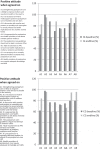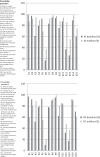Improved postpartum care after a participatory facilitation intervention in Dar es Salaam, Tanzania: a mixed method evaluation
- PMID: 28498737
- PMCID: PMC5496052
- DOI: 10.1080/16549716.2017.1295697
Improved postpartum care after a participatory facilitation intervention in Dar es Salaam, Tanzania: a mixed method evaluation
Abstract
Background: In order to improve the health and survival of mothers/newborns, the quality and attendance rates of postpartum care (PPC) must be increased, particularly in low-resource settings.
Objective: To describe outcomes of a collegial facilitation intervention to improve PPC in government-owned health institutions in a low-resource suburb in Dar es Salaam, Tanzania.
Methods: A before-and-after evaluation of an intervention and comparison group was conducted using mixed methods (focus group discussions, questionnaires, observations, interviews, and field-notes) at health institutions. Maternal and child health aiders, enrolled nurse midwives, registered nurse midwives, and medical and clinical officers participated. A collegial facilitation intervention was conducted and healthcare providers were organized in teams to improve PPC at their workplaces. Facilitators defined areas of improvement with colleagues and met regularly with a supervisor for support.
Results: The number of mothers visiting the institution for PPC increased in the intervention group. Some care actions were noted in more than 80% of the observations and mothers reported high satisfaction with care. In the comparison group, PPC continued to be next to non-existent. The healthcare providers' knowledge increased in both groups but was higher in the intervention group. The t-test showed a significant difference in knowledge between the intervention and comparison groups and between before and after the intervention in both groups. The difference of differences for knowledge was 1.3. The providers perceived the intervention outcomes to include growing professional confidence/knowledge, improved PPC quality, and mothers' positive response. The quality grading was based on the national guidelines and involved nine experts and showed that none of the providers reached the level of good quality of care.
Conclusions: The participatory facilitation intervention contributed to improved quality of PPC, healthcare providers' knowledge and professional confidence, awareness of PPC among mothers, and increased PPC attendance.
Keywords: Healthcare providers; Tanzania; facilitation; postpartum care; quality.
Figures
References
-
- The United Republic of Tanzania Tanzania demographic and health survey 2009-2010. Dar es Salaam: National bureau of statistics and ICF Macro; 2010.
-
- Pallangyo E, Mbekenga C, Källestål C, et al. “If really we are committed things can change, starting from us”: healthcare providers’ perceptions of postpartum care and its potential for improvement in low-income suburbs in Dar es Salaam, Tanzania. Sex Reprod Healthc. 2017;11:7–11. - PubMed
-
- The United Republic of Tanzania National postpartum care guidelines. Dar es Salaam: Ministry of Health and Social Welfare; 2011.
-
- Donabedian A. The quality of care. how can it be assessed? JAMA. 1988;260:1743–1748. - PubMed
Publication types
MeSH terms
LinkOut - more resources
Full Text Sources
Other Literature Sources
Medical
Miscellaneous


